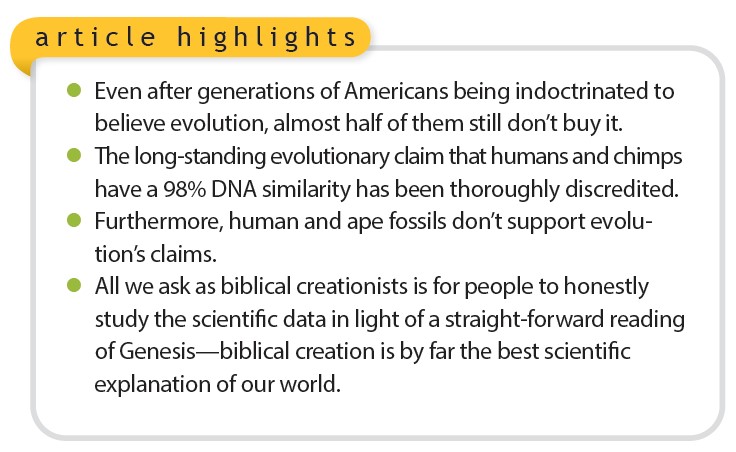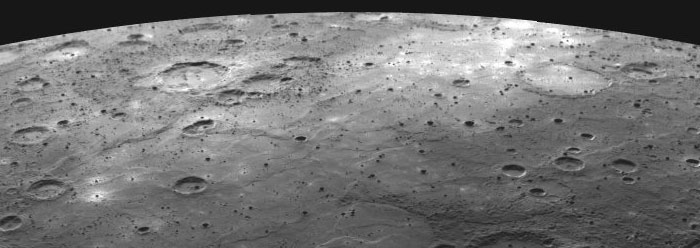 A recent study claims that a majority (54%) of Americans now accept as true the statement “Human beings, as we know them today, developed from earlier species of animals.”1 Unfortunately, given the increased secularization of American society, this increased acceptance of evolution may well be real. Nevertheless, it’s remarkable that, despite decades of attempts by the scientific establishment and popular culture to convince Americans of human evolution, 46% of Americans still reject it!
A recent study claims that a majority (54%) of Americans now accept as true the statement “Human beings, as we know them today, developed from earlier species of animals.”1 Unfortunately, given the increased secularization of American society, this increased acceptance of evolution may well be real. Nevertheless, it’s remarkable that, despite decades of attempts by the scientific establishment and popular culture to convince Americans of human evolution, 46% of Americans still reject it!Not too surprisingly, evolutionists attribute this apparent increase in acceptance of human evolution to higher levels of education and scientific literacy. In their minds, it is only natural that better informed and more scientifically literate people would accept the “fact” of evolution.
However, the “scientific literacy” usually obtained in college is a rather shallow overview of key scientific concepts. College students are exposed to evolutionary claims, but on a very superficial level. They are almost never exposed to the real problems and weaknesses in the evolutionary story.
This is demonstrated by considering some serious problems with the claim that humans and chimpanzees descended from a common ancestor six to seven million years ago.
- Long before the human and chimpanzee genomes were sequenced, a 1984 paper used a rather crude technique called DNA hybridization to convince secular scientists that humans are closely related to chimps. However, this paper was later exposed by other evolutionists as almost certainly fraudulent.2 Had it not been for this 1984 paper, the now-popular claim of a close relationship between humans and chimpanzees might never have gained traction.
- ICR geneticist Jeff Tomkins has shown that the oft-cited claim of 98 to 99% human-chimp DNA similarity was achieved by cherry-picking the genomic data.3 His more objective comparison shows that the true similarity is at best about 85%. Evolutionary biologist Richard Buggs (Queen Mary, University of London) obtained the same result using a different method.4
- A sophisticated population genetics software program called Mendel’s Accountant that uses standard evolutionary assumptions and parameters has rigorously demonstrated that even the six to seven million years postulated by evolutionists is insufficient time for a chimpanzee-like creature to transform into a human. In fact, this well-known “waiting time” problem, also known as Haldane’s Dilemma, has long been recognized as a serious problem, not just for human evolution but for the evolutionary story in general.5
Evolutionists will be tempted to see an increased acceptance of evolution as a vindication of the strength of their position. But this is more akin to jurors who have ruled a defendant guilty, but only after being carefully shielded from any exculpatory evidence and weaknesses in the prosecution’s arguments. In that case, the guilty verdict is not an indication of the strength of the prosecution’s case but rather an indication that the jurors were denied access to all the relevant facts.
Evolutionists claim that creationists are spreading “misinformation,” and some even argue that creationists should be censored. Such a claim requires considerable chutzpah given the fallacious arguments that evolutionists have disseminated over the years and the fanatical efforts of some evolutionists to stifle debate on this issue.
However, the truth is the exact opposite of their claim. ICR exists to uncover and share information that evolutionists are ignoring or suppressing. We are here to correct misinformation. We have done this for more than 50 years, and by God’s grace we will continue to do so in the years to come.
References
- Evolution is now accepted by a majority of Americans. Phys.org. Posted on phys.org August 20, 2021, accessed September 17, 2021.
- Marks, J. The Rise and Fall of DNA Hybridization, ca. 1980-1995, or How I Got Interested in Science Studies. In Workshop on “Mechanisms of Fraud in Biomedical Research,” organized by Christine Hauskeller and Helga Satzinger. The Wellcome Trust, London, October 17-18, 2011. Accessed September 15, 2021.
- Tomkins, J. and J. Bergman. 2012. Genomic monkey business—estimates of nearly identical human-chimp DNA similarity re-evaluated using omitted data. Journal of Creation. 26 (1): 94-100.
- Tomkins, J. P. 2018. Separate Studies Converge on Human-Chimp DNA Dissimilarity. Acts & Facts. 47 (11): 9.
- Line, P. 2019. The myth of ape-to-human evolution. Creation. 41 (1): 44-46.
- Rupe, C. and J. Sanford. 2019. Contested Bones. Waterloo, NY: FMS Publications.
* Dr. Hebert is Research Scientist at the Institute for Creation Research and earned his Ph.D. in physics from the University of Texas at Dallas.























